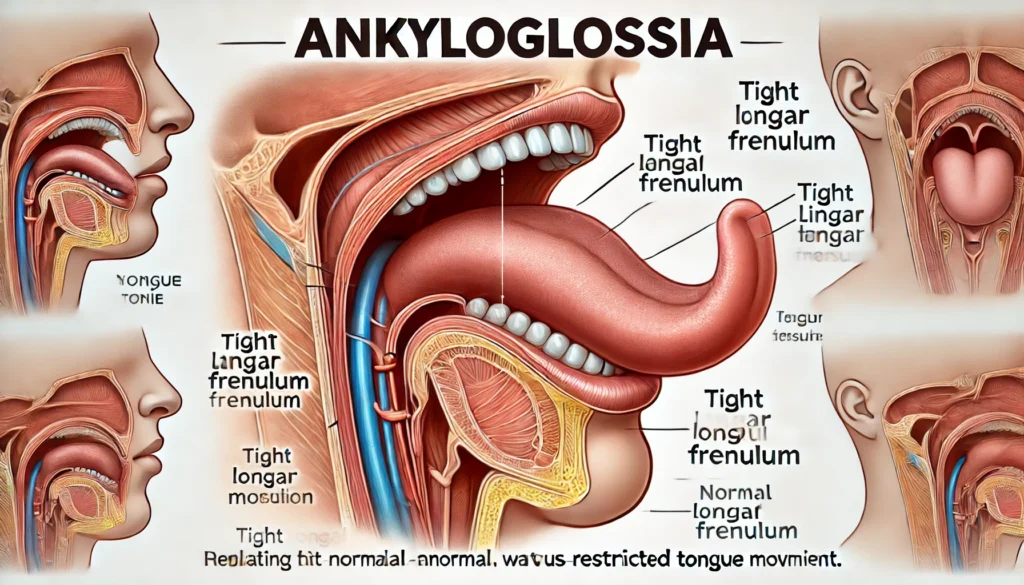
Introduction
Tongue-tie, medically referred to as ankyloglossia, is a condition where the tissue (frenulum) beneath the tongue is too tight, restricting movement. This condition can lead to challenges in breastfeeding, speech, and oral hygiene. Fortunately, advances in physical therapy and surgical techniques make it easier to address tongue-tie effectively.
For residents of Mableton, Georgia, seeking professional assistance for physical therapy for tongue tie releases is now more accessible than ever. This guide provides a comprehensive understanding of tongue-tie, treatment options, the importance of physical therapy, and local resources.
Understanding Tongue-Tie
What Is Tongue-Tie?
Tongue-tie occurs when the lingual frenulum is too short or tight, limiting the tongue’s range of motion. This can result in difficulties such as:
- Breastfeeding issues in infants.
- Speech impediments in children.
- Oral health complications in adults.
Symptoms of Tongue-Tie
- Difficulty sticking out the tongue.
- Trouble breastfeeding for infants.
- Speech issues, including unclear pronunciation.
- Oral hygiene problems, such as food debris accumulation.
Diagnosis of Tongue-Tie
How Is Tongue-Tie Diagnosed?
Tongue-tie is typically diagnosed through a clinical evaluation by healthcare professionals such as pediatricians, lactation consultants, or speech therapists. Tools like the Hazelbaker Assessment Tool for Lingual Frenulum Function can provide further insights.
Treatment Options for Tongue-Tie
Surgical Interventions
- Frenotomy: A quick procedure where the frenulum is cut to free the tongue.
- Frenuloplasty: A more comprehensive surgery requiring sutures, often performed under general anesthesia.
Non-Surgical Approaches
Physical therapy and myofunctional exercises can be effective in improving tongue function, especially in mild cases.
Role of Physical Therapy in Tongue-Tie Management
Physical therapy plays a crucial role in preparing for and recovering from tongue-tie surgery. Therapists focus on strengthening oral muscles, improving tongue mobility, and ensuring proper alignment of the jaw and neck.
Benefits of Physical Therapy for Tongue-Tie
- Enhances surgical outcomes by preparing the tongue and surrounding muscles.
- Prevents complications such as scar tissue formation.
- Improves overall oral functionality and comfort.
Physical Therapy Techniques for Tongue-Tie
Common Techniques
- Myofascial Release: Relieves tension in the surrounding muscles.
- Craniosacral Therapy: Focuses on the alignment of the skull and spine.
- Oral Motor Exercises: Includes tongue stretches and strengthening exercises.
The Importance of Pre-Operative and Post-Operative Physical Therapy
Pre-Operative Physical Therapy
Before surgery, therapy helps prepare the oral muscles, ensuring better results and reducing post-operative discomfort.
Post-Operative Physical Therapy
Post-surgery therapy focuses on:
- Preventing reattachment of the frenulum.
- Enhancing mobility through targeted exercises.
- Promoting long-term functional improvements.
Local Resources in Mableton, Georgia
For residents of Mableton, several clinics specialize in physical therapy for tongue-tie releases. Below is a table summarizing some options:
| Clinic Name | Services Offered | Contact Information |
|---|---|---|
| Tongue-Tie Center of Atlanta | Frenotomy, myofunctional therapy | (123) 456-7890 |
| Flow Myofunctional Therapy | Pre- and post-operative therapy, craniosacral therapy | (234) 567-8901 |
| The Tongue Therapy Group | Specialized tongue-tie therapy for all ages | (345) 678-9012 |
Insurance and Cost Considerations
Understanding the costs associated with tongue-tie treatment is crucial. Many insurance plans cover surgical procedures like frenotomy, but coverage for physical therapy may vary. It is advisable to:
- Consult your insurance provider.
- Ask clinics about payment plans or financial assistance options.
Conclusion
Addressing tongue-tie effectively involves a combination of surgical intervention and targeted physical therapy. For residents of Mableton, Georgia, access to specialized services ensures that individuals can achieve optimal outcomes. By consulting experienced professionals and adhering to recommended therapy protocols, patients can overcome the challenges of tongue-tie and enjoy improved functionality and quality of life.
FAQs
Can tongue-tie affect swallowing in adults?
Yes, tongue-tie can lead to difficulty swallowing due to restricted tongue movement, affecting overall digestion.
Is myofunctional therapy necessary for infants?
While not always necessary, myofunctional therapy can improve feeding and reduce discomfort for tongue-tied infants.
How long does post-operative therapy last?
Post-operative therapy can last anywhere from 4 to 12 weeks, depending on the severity and individual progress.
Are there any risks associated with tongue-tie surgery?
Risks are minimal but can include mild bleeding, infection, or reattachment if proper care is not followed.
Can tongue-tie recur after surgery?
Yes, reattachment can occur if post-surgery exercises and care are not properly implemented.
Can tongue-tie affect speech development in toddlers?
Yes, tongue-tie can restrict the tongue’s range of motion, which may lead to speech delays or articulation problems, such as difficulty pronouncing certain sounds like “r,” “l,” “t,” or “th.”
Is laser surgery better than traditional tongue-tie surgery?
Laser surgery is often preferred as it is minimally invasive, causes less bleeding, and has a faster healing time compared to traditional methods. However, the choice depends on the individual case and surgeon’s recommendation.
What is the ideal age for tongue-tie treatment?
Tongue-tie can be treated at any age, but early intervention, such as in infancy or early childhood, is often recommended to prevent feeding or speech issues from worsening.
Are there any side effects of tongue-tie physical therapy?
Side effects are rare but may include temporary muscle soreness or discomfort during exercises. These typically resolve quickly as therapy progresses.
Can tongue-tie cause dental issues?
Yes, tongue-tie can lead to dental issues like misaligned teeth, difficulty cleaning teeth properly, and an increased risk of cavities or gum disease due to restricted tongue movement.
Recommended Articles:
Music Communities Like CLLV: A Comprehensive Guide to Joining and Thriving
Decorah Woman Check Forgery Brincks Case: A Comprehensive Guide
The Tragic Story of the Fisher Boys Drowning in Baton Rouge Off Harding Blvd
Sparkspitter Candle: A Complete Guide to Its Power, Mechanics, and Gameplay Mastery
Comprehensive Guide to Mableton Georgia Physical Therapy Tongue Tie Releases






